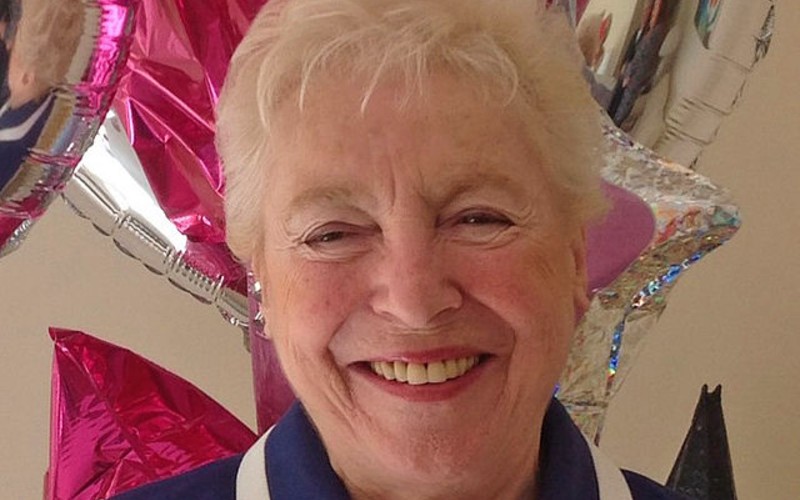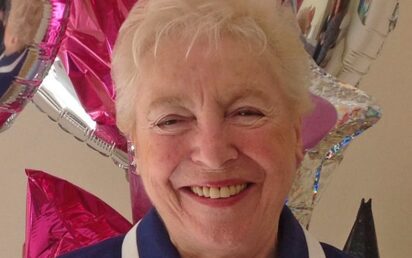Tech pioneer Dame Stephanie Shirley has died aged 91.
Dame Stephanie’s family shared the news in an Instagram post on Monday. She passed away on Saturday.
The entrepreneur and philanthropist (pictured in 2013) blazed a trail for women in technology and raised tens of millions for causes including autism after her only child, Giles, suffered from an extreme form of the condition.
Born Vera Buchthal in Dortmund in 1933 – where her Jewish father served as a judge – her family were forced to flee Nazi Germany to Austrian capital Vienna and she came to Britain aged five as part of the Kindertransport rescue effort which brought 10,000 children to the UK.
She and her older sister Renate were placed with the Smiths in the West Midlands and quickly learned English to attend school as the Second World War began. Their parents survived the war but when they were reunited, the experience was not as they hoped.
“My father remarried and had another family. I only heard of his death a year after it happened. My mother was always critical of me,” recalled Dame Stephanie.
Later Dame Stephanie, then aged 83, would tell me that “my refugee start left me with serious depression – the classic survivor guilt”.
Becoming ‘Steve’ & a pioneer for women
After earning a degree at Sir John Cass College in London, she worked in the Post Office research department, helping to develop electronic telephone exchanges and the premium bond computer, Ernie.
In 1959 she married Derek Shirley, a physicist. After experiencing the ‘glass ceiling’ for women she soon decided to found her own software company from her dining room table with just £6 capital.
The business, FI Group – later known as Xansa – prospered after her husband suggested that she change the name she used to ‘Steve’ in correspondence with prospective clients.
In 31 years as chief executive, she built Xansa into a FTSE 250 leading technology group, officially retiring when the business was sold in 1993 for around £150m.
Yet it was for her role in providing opportunities for women that she is best-known. Dame Stephanie initially hired almost exclusively women, before the passing of the Sex Discrimination Act in 1975 made this illegal.
She offered these employees the opportunity to work flexible hours from home to fit around their family responsibilities. Never one to sit on the fence, she told me in 2017: “Women certainly perceive barriers in tech, but they have it so easy today compared to how it was 50 years ago.
“Back then there were certain things women were literally not allowed to do as they manoeuvred their way through life, such as work on the stock exchange or drive a bus – there were all sorts of legal issues.
“The issues today are covert and therefore much more complex to confront than when I was battling against legislation: if a man and a woman went out on a sales call together, the assumption might be that the man was senior and the woman the subservient staff member.
“However, there is nothing in the IT industry that is not 100% suitable for women. Whenever you survey women of any age, in any country, the two things that come out as very important to them are flexible working and work/life balance. IT allows that.”
She continued: “The leadership model – leaders determining what the next leaders will be expected to be – is crucial. The model at the moment is male.
“Men lead in a different way: their body language is quite different, they are assertive, they will claim knowledge of something even when it’s quite superficial; whereas women will say ‘yes, I know a little bit about that’, or ‘I can find out’, and we’ve quite different body language.
“It’s a definition of leadership. If you’re the conductor of an orchestra, for example, a man and a woman may get equally good results but they do work in a different way, which is why for many years we didn’t have any female conductors in music.”
Giles & autism
Stephanie was appointed an OBE in 1980, made a dame in 2000 and recognised as a member of the Order of Companions of Honour in 2017. She has donated more than £70m to charity, much of it to organisations focused on autism.
Indeed the Shirley Foundation would become one of the 50 largest charitable grant-giving foundations in the country. Her generosity would see Dame Stephanie drop out of the Sunday Times Rich List.
She gave birth to her only child, Giles, in 1962 – around the time she set up her business – but at the age of two he lost his ability to speak and was diagnosed with severe autism. She worked shifts with Derek to look after an increasingly violent Giles: “Some months were so black I felt we were living in a horror film,” she recalled later, revealing that they considered a joint family suicide but did not go through with this because Giles could not give his consent.
Mental health & entrepreneurship
Following a nervous collapse in 1974, Dame Stephanie was admitted to hospital. She and her husband realised that they could no longer cope with Giles and placed him in an institution; however by 1985, they brought him home as they found his treatment to be unacceptable.
Dame Stephanie established a small care home for autism sufferers in Henley-on-Thames, with Giles as the first resident. In 1998 he died, aged 35, during a severe epileptic seizure.
Speaking to me about mental health two decades on, Dame Stephanie said: “The classic antidote to mental health problems is compassion – and I am now comfortable in my skin and happy with my focus on philanthropy.
“However, the combined pressure of caring for my profoundly autistic son, Giles, whilst leading my IT company led to a good old-fashioned nervous breakdown. Basically, I ceased to function. The company kept pretty quiet about this at the time.
“Entrepreneurial pressure and its excitement suits some, not others. The pressure may be worse when people go into business as alternative employment rather than in pursuit of a vision.
“I was the laughing stock of the industry when I started in 1962 – people would say to me ‘you can’t sell software’ – and it was 25 years before the company paid a dividend. Even Microsoft took 10 years.
“Tech entrepreneurs often have unrealistic expectations and then have to cope with failure. Ultimately tech entrepreneurs face continual change and aggressive international competition.”
However she continued: “If that’s not what they enjoy, they should ‘get out of the kitchen’. Female entrepreneurs face extra pressure around things like getting funding but such cultural issues are nothing to do with being digital.
“To look after my mental health I now have a healthy selfishness and, since my breakdown, try positively to keep my energy and spirits buoyed up. Skype conversations with family and friends are a help too.
“Co-workers can support people with mental health issues in exactly the same way as they would a physical illness or disability: be understanding of any difficulties, don’t patronise and don’t avoid the issues.
“I also believe that the combination of home and work pressures is something all managers need to look out for in their staff.
“When I came out about my issues initially people were surprised. Then they just accepted the fact in the same way they know I am diabetic and have special eating requirements.”
Derek Shirley died in 2021.
Oxford Nanopore founder & CEO to leave after two decades in role


